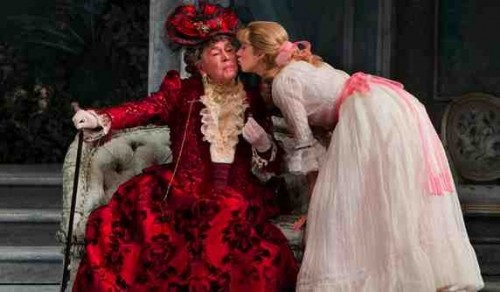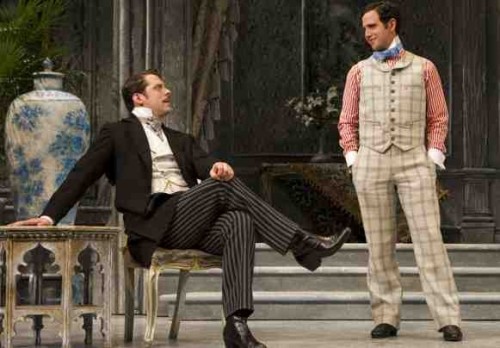The Importance of Being Earnest at New York's Roundabout
Brian Bedford Directs and Stars Live in HD
By: Susan Hall - May 30, 2011
The Importance of Being Earnest
By Oscar Wilde
Presented by the Roundabout Theater Company
Directed by Brian Bedford
HD broadcast
Great Barrington, Mahaiwe June 9
Williamstown, Clark Art Institute June 18
Amherst, Amherst Cinema, June 2, 18, 21, 26
David Hyde Pierce, Host
Brian Bedford, Lady Bracknell
Paxton Whitehead, the Rev. Canon Chasuble
Santino Fontana, Algernon Moncrieff
David Furr, Jack Worthing
Tim MacDonald, Merriman
Paul O’Brien, Lane
Charlotte Parry, Cecily Cardew
Saa Topham, Gwendolyn Fairfax
Amanda Leigh Cobb, Servant
Dana Ivey, Miss Prism
Desmond Heeley, sets and costumes
Duane Schuler, lighting
Drew Levy, sound
Oscar Wilde’s whirlarounds abound in his arguably best play. The Importance of Being Earnest arrives at various neighborhood venues throughout June. Brian Bedford directs and stars as Lady Bracknell in this masterpiece.
The play gathered together themes that had preoccupied Wilde over the years and flowed from pen to paper with ease.
The title had first been used as a subtitle: “Some remarks on the importance of doing absolutely nothing.” The lazy mood of the two young friends in the play is the posture of aestheticism: “Laziness is the one divine fragment of a godlike existence left to man from Paradise.”
In essays Wilde had repudiated marriage, the family and private property, and in The Importance he does away with them by making them so important. Salome incriminated notions of sin and guilt. In Importance they are teased out of existence. The unspeakable sins of Dorian Gray become silly and all vices become innocuous.
Double lives with which Wilde was obsessed become ‘Bumburying’ in Earnest. To Bumbury you use an imaginary double to avoid boredom, not to advance a secret sexual adventure. The author wrote Earnest at a seaside resort accompanied by his wife and two boys. The play was rehearsed while he was in Algiers with Lord Douglas, his boyfriend (Bosie), and also busy introducing Andre Gide to young Algerian boys.
The idea of paying for your sins is mocked. Jack’s ward says, “They have been eating muffins. That looks like repentance.” Muffins!
Beneath a splendid veneer of scintillating dialogue and in an upside down world in which exactly the opposite of what should be is celebrated, Wilde contains the problems of being gay in the Victorian world.
Today we well understand the complications of a dual life and the tragedies that result. Wilde, clever as he was, did not. Shortly after the opening of the play, in which he made sure that his lover Bosie’s Dad was denied a ticket, Wilde was tried and then sent to prison to do hard labor for two years. This was the beginning of the end for a marvelous master of the word.
Don’t worry about the heavy thoughts. Bedford has directed Wilde straight up and it is as neat as a shot of good whiskey. However, remembering after shocks is as inevitable as the Stonewall riots.
Such sad thoughts are put aside when Santino Fontana and David Furr take to the stage. The first crisis arises when cucumber sandwiches are stolen. Comic energies spring from reality which is mocked. The two lead characters are about to be re-baptized. Deception is everywhere canceled by spontaneity and humor. Tears are taboo. When a friend suggested the play was like a delicately embroidered mosaic, Wilde retorted, “No, it must go like a pistol shot.” Under Bedford, it does.
Comedic laughter is a good trolley on which to deliver great pain. Although society immediately before World War I had succeeded in containing behavior and mores, everywhere, Wilde not excepted, people were hammering at the rules and constraints. Wilde hammers with particular wit.
The initial subtitle for Earnest was: “A trivial comedy for serious people.” Shaw mistakenly thought it was “all froth and no pith”, but everyone else loved it and it continues to. Thank God for froth, a treat for serious people and all others too.




